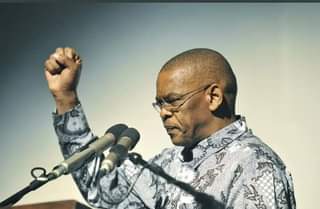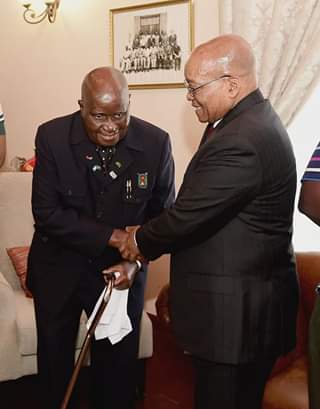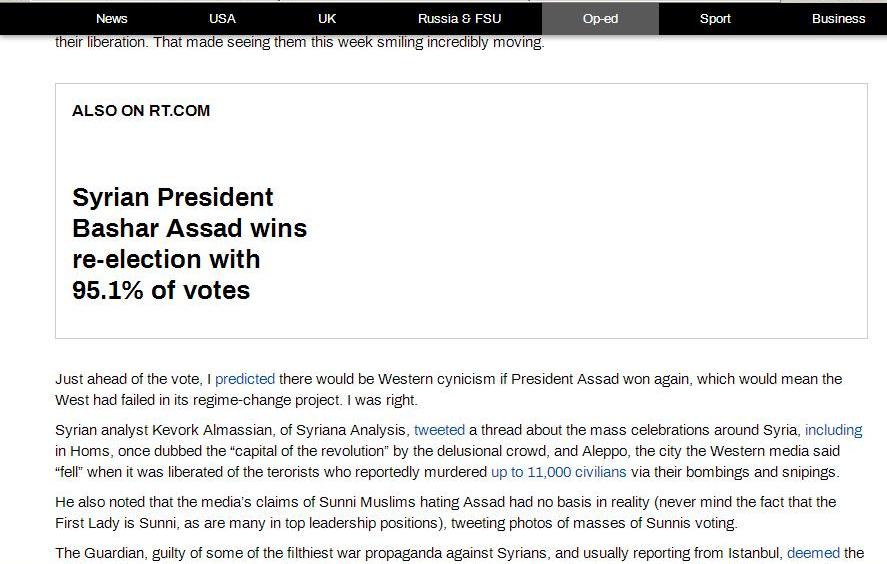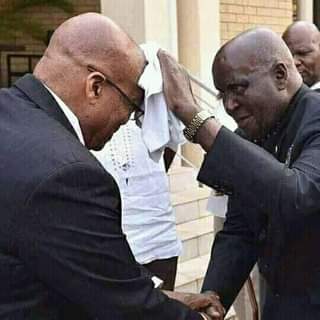Dr Kenneth Kaunda: “The multi-party democracy systems of the West are not suitable for African states”
[Side note by Izazi Team: The power of the Rothschilds over the African continent and its wealth lies in African people’s recognition of their counterfeit Western political systems. Currently a country called South Africa is governed by Johann Rupert and Nicky Oppenheimer, both members of the Rotshschild oligarchy, while on the other hand it is deceptively sold by the mainstream media they own as a majority rule...

Former SA President Nelson Mandela, former Zambian President Kenneth Kaunda and former ANC President Oliver Tambo
According to reliable sources, it is Johann Rupert who instructed Cyril Ramaphosa, the so called President of South Africa and his National Executive Committee to suspend ANC Secretary General Ace Magashule from party activities "or else no private business will fund the ANC.”
This is the same political blackmail the fake Jews played in their campaigns to have SACP Secretary General Chris Hani eliminated. “It’s Hani’s head on the table or there will be no election date.”
Hani was assassinated on the 10th of April 1993, and on the 27th of April the following year; the same month of his assassination the previous year, the first democratic elections were held in South Africa.
27 years later today, the same year spanning the period Mandela spent in jail for his struggle for liberation; the same people who used Hani’s head to bargain for an election date in 1993 have once again put ANC Secretary General Magashule’s head on the block to be slaughtered so that the ANC could get funding from the apartheid capital.
This is to pave way for the NGC or the next National Conference to take place without Magashule because he is the only ANC Top 6 member who is willing to implement the resolutions of the ANC taken during its National Conference in 2017, namely the nationalisation of the Reserve Bank and expropriation of stolen land without compensation; a white monopoly capitalists’ worst nightmare.
Magashule was elected by the Branches of the ANC, only now to be suspended from party activities by two white men with money who are not even members of the organisation; Johann Rupert and Nicky Oppenheimer. This means, as Kaunda insists on a quote in this article, that Western democracies in reality are a minority rule scam the Western plutocrats have so far successfully sold as a majority rule to the African continent.
This means UMKhonto we Sizwe (MK) has not even started defending former President Jacob Zuma and Radical Economical Transformation until the military wing of the ANC has completely dismantled the Western economic system in South Africa, which is the breeder and funder of all anti-Black people empowerment activists and foot-soldiers like the corrupt judicial system, the corrupt Police Ministry and the partisan SA Defense Force leadership which currently act as buffer and human shield for the white land thieves and their monopoly capital.

Which explains why Russia’s President Vladimir Putin (above) allegedly advised Zuma in 2009 to arrest South Africa’s top 5 richest persons if he didn’t want to face similar problems in future he went through whilst he was a Deputy President of the country].

ANC Secretary General Ace Magashule
By Ace Magashule
The great 15th century British poet, John Donne, wrote in the first two lines of his most famous sonnet ‘Death Be Not Proud’:
“Death be not proud, though some have called thee Mighty and dreadfull, for, thou art not soe”
President Kenneth Kaunda loved the sonnets of Donne, and he could – probably from his days as a teacher – quote many a verse from them by heart. In the latter part of his life, as he learnt to live with the challenges of old age and his own mortality, when was asked about his well-being, he loved to quote these first two lines of ‘Death Be Not Proud’.
When we received the sad news that President Kaunda had passed on at the Maina Soko Military Hospital in Lusaka, at the ripe old age of 97, the first thought that came to mind was that the incredible life that President Kaunda lived, and the beautiful legacy that he leaves behind, can never be wiped out by the ravages of death, no matter how mighty and dreadful we feel they are.

Zambian President Kenneth Kaunda, Mozambican President Samora Machel and President of Tanzania Julius Nyerere
President Kenneth David Kaunda was born on the 28th of April 1924 at Lubwa Mission in Chinsali, then part of Northern Rhodesia, now Zambia, and was the youngest of eight children. His father, the Reverend David Kaunda, was a pastor of the Church of Scotland, and his mother was the first African woman to become a teacher in the then colonial Zambia.
The young Kenneth Kaunda followed in his beloved mother’s footsteps, and also became a teacher. He cherished the profession, and combined it with being a Choirmaster, giving expression to his great love for choir music.
The outstanding performances of the choirs that he led are legendary throughout Zambia. Being an accomplished pianist and blessed with a beautiful tenor voice, President Kaunda touched many a heart with his performances, together with some of the greats of African music, such as the late Mama Miriam Makeba.
After having received the news that President Kaunda had passed on, I sat down and watched a recording of him on YouTube, already in his ripe old age, playing the guitar and singing a love song dedicated to his late wife Betty, whom he loved dearly. Together they have built a family of eight children.
Former Zambian President Kenneth Kaunda and former SA President Jacob Zuma
President Kaunda also gave expression in music and song to his political ideals, and the independence of Zambia which was his life’s work. Who does not know the liberation song, “Tiyende pamodzi ndi mtima umo”, literally meaning, “Let’s walk together with one heart”, that he composed? As President of the United National Independence Party (UNIP) he led the delegates singing this hauntingly beautiful liberation song at every party conference. Nor can any of us forget his beautiful funeral tribute to President Mandela, interspersed with song.
President Kaunda’s long life in politics started while he was still a school teacher, and he became a founder member of the Northern Rhodesian African National Congress. He rose quickly in the ranks of the party, and in 1953 became the Secretary General. Unhappy with the influence of white liberals on the party, he broke away in the 1958, and first formed the Zambian African National Congress, and subsequently in 1960 the United National Independencce Party (UNIP).
As President of UNIP he led the Cha-cha-cha civil disobedience campaign against the British colonial rulers of Zambia. This campaign was central in gaining Zambia’s independence, and on the 24th of October 1964, with the victory of UNIP at the election polls, President Kaunda became the first President of an independent Zambia.
President Kuanda’s founding roots as a teacher found expression in his administration having declared education as it’s apex priority. At the time of independence Zambia’s educational system was one of the most poorly developed in all of Britian’s former colonies. It had just 109 university graduates, and 0,5% of the population had completed primary education. As one of the first major steps of his new administration President Kaunda instituted a policy where all children irrespective of the parent’s ability to pay, were given free exercise books, pens and pencils. The parent’s main responsibility was to buy uniforms, and pay a very small token ‘school fee’, and to ensure that their children attend school.
Zambia’s success in building an excellent education system, and achieving high literacy rates within one generation, up to this day stands as one of President Kaunda’s greatest achievements. The University of Zambia, with President Kaunda as its Chancellor, was opened in Lusaka in 1966, with Zambians all over the country having contributed whatever they could afford towards its construction. Other tertiary-level institutions established during President Kaunda’s era were vocationally focused, and fell under the aegis of the Department of Technical Education and Vocational Training, that he had also pioneered.
The greatest challenge that President Kaunda had to face was that he inherited a Zambian economy that was totally under the control of foreign white colonial companies. So for example was the British South African Company (BSAC) (founded by Cecil John Rhodes) totally in control of Zambian mineral rights. Only by threatening to expropriate and nationalise the mines, did UNIP manage to exert some minor concession and limited control from BSAC. However, as it turned out to be case in many other African countries that gained their independence during the same period, it was never enough to free the economy of Zambia from the strangle grip of imperialist economic power.

While it has been easy for Western plutocrats to dupe African people with their economic and political scam systems, Syrians have not fallen for the trick as they recently proved this at the polls by giving President Bashar al Assad a landslide victory regardless of heavy Western propaganda against him
President Kaunda achieved some limited success with a programme of national development (known as the ‘Transitional/First and Second National Development Plans’), which concentrated on investment in the infrastructure and manufacturing sectors. This was followed up by the Mulungushi Reforms to acquire equity holdings (51% or more) for the Zambian State through the Mining Development Company (MINDECO) and the Finance Development Company (FINDECO), in key foreign owned companies.
These attempts by President Kaunda and UNIP proved to be unacceptable for the international neo-imperial powers. A further critical factor that turned Zambia into a target of white Western European and USA attacks, was President Kaunda’s principled support for the ongoing anti-colonial liberation struggles in Southern Africa, and specifically that he protected the African National Congress (ANC), and allowed us to have our Head Office in exile in Lusaka.
One of the greatest contributions that President Kaunda made to the nations of Southen Africa was to have turned the Zambian capital, Lusaka, into the head quarters, of not only the ANC, but also of, among other liberation movements, Frelimo, ZAPU and SWAPO. When the respective Southern African states were eventually liberated President Kaunda played a leading role in the establishment of the Southern African Development Community (SADC). His commitment to the whole African continent found expression in his Chairpersonship of the Organisation of African Unity (OAU) from 1970 to 1971, and again from 1987 to 1988. As a true internationalist he was also the Third Secretary-General of the Non-Alligned Movement.
For all of this Zambia – and specifically President Kaunda – came under vicious and sustained attack from neo-colonial imperialists. In 1973 a massive increase in the oil price was followed by a steep slump in copper prices. It is important to remember that in 1973 the price of copper accounted for 95% of all Zambia’s export earnings. In two years, by early 1975, this had halved in value.
By 1976 Zambia was faced with a massive balance-of-payments crisis. As a consequence Zambia, despite President Kaunda’s best efforts, sadly went the route of many other African countries and fell into debt with the International Monetary Fund (IMF). The Third National Development Plan had to be abandoned, and sadly crisis management replaced long-term planning.
The IMF insisted that the Zambian government should ditch its developmental objectives and restructure the economy by ending price controls, devaluate the Kwacha, severely cut government spending, and cancel the subsidies on food and fertiliser.
The IMF enforced lifting of food subsidies caused the prices of basic foodstuffs to skyrocket. This sparked riots. President Kaunda tried to severe ties with the IMF in May 1987, and introduced a New Economic Recovery Plan. However, the powerful international economic forces colluding against him were overwhelming. Against his will he was frog-marched into a new arrangement with the IMF, and forced to make major policy shifts, including the privatisation of parastatals.
The die was cast. President Kaunda’s strongly held belief that multi-party democracy systems were not suitable for many African states, including Zambia, was in addition to the economic pressure from the IMF and World Bank, constantly under attack.
Matters quickly came to head from 1990 onwards, and President Kaunda was forced to concede to multi-party elections. On the back of the carefully orchestrated economic collapse of Zambia by the IMF, and Western European and USA imperialism, and the immense hardships that it caused to the people of Zambia, UNIP and President Kaunda, were swept out of power and replaced by the Movement for Multiparty Democracy (MMD) of Frederick Chiluba. President Kaunda accepted this defeat and stepped down as President of Zambia.
This was an extremely painful and humiliating experience for the Father of Zambia, but he handled it with great political maturity and dignity.
The former President of Nigeria, General Olusegun Obasanjo, tells how in 2015 he visited President Kaunda at his home in Lusaka. President Kaunda was visibly pained, and broke down and cried, when he said that the Africa that we have today, is not the Africa he and his contemporaries (and he specifically mentioned his great friend, President Julius Nyerere, of Tanzania) had fought for. He talked about how deeply disappointed he was about the situation that led to his removal as President, and the indignity that the Chiluba regime inflicted on him, by having tried to revoke even his Zambian citizenship.
It is a measure of the greatness of the human being, and leader, that President Kaunda was that he was not broken by all of this. He kept his head high, and maintained his unshaken belief that Africa will eventually rise. In his ripe old he became an ardent HIV/AIDS activist, when one of his children succumbed to the disease. He continued to speak out for the poor and oppressed not only in Zambia, but throughout Africa, and the world.
Over time the people of Zambia came to realise that the anger and rejection that they felt in the midst of economic collapse and suffering, was orchestrated and manufactured. They came to see President Kaunda for the great and compassionate leader that he was, and in the last years of his life the Zambian nation poured out their adoration and love for him whenever he visited the villages, towns and cities, of Zambia.
President Kaunda was a deeply committed Christian, and it is truly the Grace of God that he lived long enough to be embraced by the love of his people, and his legacy is finally honored. Thus, his long dignified life has become the very personifaction of that poem by John Donne, that he loved so much. 
Kaunda gives Zuma his blessing
For us as South Africans, who have hugely benefitted from President Kaunda’s courage and magnanimity, through his unwavering support for our own liberation struggle, at great cost to himself and the Zambian nation, there are many important lessons to be learnt from the example of his life.
After having gained our right to vote in a non-racial and democratic society, we now also experience that we are being denied our full economic liberation. Similarly to what the people of Zambia were/are subjected to, big international and local monopoly capitalist companies are refusing cede control of our economy. Similarly there is a concerted and well-engineered effort to undermine the legitimacy of our South African state, as well as the legitimacy of the African National Congress (ANC) as the pre-eminent Liberation Movement and leader of society. Similarly we are being forced to make deals with, and become indebted to the devil that is the IMF.
As South Africans – although the situation is already grim for us – we still have a chance, if we are prepared to muster our collective strength, regain the revolutionary heart of the ANC, and fight back to prevent the terrible calamity that befell President Kaunda and his beloved Zambia.
President Kaunda passed on during our South African Youth Month, in doing so the baton in the battle for full economic liberation is symbolically passed on to a new generation of youth, who now like the courageous youth of 1976, again have to take the lead in achieving fundamental and Radical Economic Transformation (RET), so that they can rise like soaring eagles to the commanding heights of our economy, free from the shackles of perpetual economic exploitation.
In addition to all the great gifts that President Kaunda already bestowed on us as a nation, perhaps his greatest gift and legacy will be if we can learn from his life, and we can unite to say to those who want to kill the ideal of our full liberation: “Mighty and dreadfull, thou art not soe”… As we bade farewell to our beloved KK we say: You were a true African with a huge warm heart. A mighty boabab tree under whom we during the most difficult days found shelter. We will not fail you. We will honour your legacy. We will continue to fight for our full liberation. Hamba Kahle!
*Elias Sekgobelo ‘Ace’ Magashule is the Secretary General of the ANC. He wrote this article in his personal capacity.
